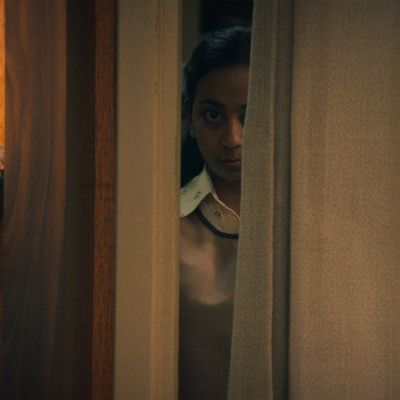
Every time a new season of Black Mirror drops, there’s a discussion of which episodes are the good ones. Part of the reason this show is so subjective is that everyone is looking for something different when they watch it: To me, “Joan Is Awful” is too wacky for this show, while “Beyond the Sea” is too dour, but both of those episodes have their fans.
“Demon 79” is perhaps the only episode this season to really strike the perfect tonal balance: funny, but not at the expense of story, and dramatic without taking itself too seriously. It’s ironic because this is perhaps the least Black Mirror-y episode ever; unlike the unusual “Mazey Day,” which at least used paparazzi cameras as its technological focus, this one barely involves tech or the media at all. Like the previous episode, it’s more fantasy than science fiction — but unlike that one, the shift in genre somehow doesn’t feel out of place.
Nida (Anjana Vasan) is a quiet young Indian woman living in the predominantly white town of Tipley in 1979. She sells shoes at a store called Possetts, where she regularly ignores racist remarks from her manager, Vicky, who complains about the smell of her biryani lunch. Everyone in Tipley seems determined to make it clear that Nida doesn’t belong here. That includes Michael Smart (David Shields), the conservative MP front-runner, whose good looks and focus on civility hide an agenda every bit as nefarious as the more outwardly hateful far-right National Front party.
Nida may be a deeply nonconfrontational person, but she regularly fantasizes about a version of herself that could stand up to the bullies she encounters daily — not just the bigots but people like Keith Holligan, a local customer who killed his wife a few years ago. She pictures strangling Keith like he strangled his wife, and she pictures smashing Vicky’s head through a glass case after seeing her pointedly reading a National Front pamphlet. After all, just that morning, she found the party’s logo spray-painted on her front door.
After Mr. Duncan asks Nida to eat her lunch in the basement, she discovers a small stone talisman, taking it home without realizing its significance. Soon after, though, the talisman starts speaking to her; apparently, when she cut herself, she anointed it with her blood, summoning a demon named Gaap of Misophaes. At first, Gaap appears as a terrifying horned creature, but then he switches to a more appealing human form, inspired by Nida’s fixation on Boney M. singer Bobby Farrell (Paapa Essiedu).
Gaap explains that Nida will need to carry out three human sacrifices by May Day — at least one per day — or the world will end. He even shows her a glimpse of the fiery apocalypse that awaits them, pointing out that the increasing likelihood of nuclear warfare is a manifestation of this biblical threat. For Gaap, supervising this process and helping avert Armageddon will mean proving himself and “earning his wings” down in hell. He’ll be cast out into infinite nothingness if he doesn’t pull it off.
Nida is finally swayed to commit her first kill at a nearby canal, where Gaap convinces her to clobber a nearby dog walker with a brick by showing her a vision of the man sexually abusing his 8-year-old daughter every night. With his ability to see everyone’s future, Gaap is able to reassure her that this is for the best; little Laura would’ve grown up to commit suicide at 28 if the abuse continued on, but now she’ll live a full life.
Kill two happens the next day when Nida and Gaap visit the local pub to scope out some candidates. She doesn’t typically drink, but she’ll need a couple of triple scotches to pull this one off. Luckily, she catches the eye of the perfect victim: Keith Holligan, who she already fantasizes about killing anyway. And while she’s still too shy to run straight at him with a hammer, she eventually manages to get the job done back at his place. It’s a fascinating scene, with Keith accepting he’s about to die as a punishment for what he did.
Like “Loch Henry,” “Demon 79” often subverts the expected violent confrontations. The Keith murder scene, and the scene of Nida stabbing his “ordinary” brother Chris only minutes later, are suspenseful not because we think Nida might die, or even because the lives of billions are at stake. The tension comes from watching Nida grapple with what she’s doing; what’s most at stake is her soul. As Gaap points out, she’s the ideal person for this job (and, on a meta-level, the ideal character for this story) because she’s broadly a “good person” while still being corruptible. Like most of us, there’s a dark force inside her, waiting to be brought out in the right circumstances.
Unfortunately, it turns out Keith doesn’t count for human-sacrifice purposes, since he has already killed someone himself. But at work the next day, there are plenty of options: not only the detestable Vicky or Mr. Duncan, but Michael Smart, who uses Mr. Duncan’s cottage on the weekends. The more Nida learns about him, the more he seems like the right person to sacrifice: As Gaap reluctantly shows her, Smart will later go on to launch a new far-right party focused on criminalizing immigration, growing to demagogue levels, and becoming prime minister. Gaap doesn’t want Nida to kill Smart, given the man’s popularity with the other demons, but he technically works as a sacrifice since his actions have only indirectly killed people.
Throughout the episode, we get brief glimpses of the police investigation into Nida’s murders, led by Len Fisher (Shaun Dooley). But Brooker and Bisha K. Ali’s script never drifts too far from Nida, and the scene when she and Len finally come together is one of the most satisfying. He’s empathetic, hearing that yesterday was her late mother’s birthday, but it doesn’t diminish his suspicions, especially when Nida pretends she doesn’t recognize Keith.
So later that night, he follows Nida while she follows Smart after his big town-hall speech. Here, we see how much Nida has changed just in the past couple of days: She’s wearing the bold mannequin outfit she never thought she could pull off, and she’s aggressive in her tactics, rear-ending Smart before running him off the road into a tree. Seeing he’s still alive, she doesn’t hesitate to come at him with a hammer, hitting him twice — but Len gets there before she can take the killing shot, and she just can’t justify killing Len when she knows he’s a good man. Like Dexter Morgan, Barry Berkman, and many of TV’s other murderous anti-heroes, Nida justifies hurting people with a code: She only kills bad people. Ironically, that rule is what ends up killing billions in the end.
For the whole episode, we’ve been led to consider the possibility that Gaap is all in Nida’s head, especially because people called her mother “mad” too. So I found it a huge relief that, ultimately, Brooker and Ali do go through with the ending they promised. Nida is weirdly vindicated: After the police hear her unbelievable story at the station and the clock strikes midnight, they look out the window to see that the nuclear holocaust is officially upon them. In Nida’s final moments on earth, she reunites with Gaap, who invites her to join him as a human companion in eternal oblivion. It makes for a perfectly Black Mirror “happy” ending.
Like most of the best episodes, “Demon 79” is sustained by the characters: Nida is easily the most compelling protagonist of the season, and Vasan and Essiedu’s great chemistry distracts from the potential clichés of their dynamic. But, as I mentioned before, it’s also about the tone. This is a goofy episode about demons, territory that this show has never touched before, but it feels of a piece with previous seasons.
Looking back at season six, it feels like Charlie Brooker set out to do something new this time — to open up the show to exploring new genres and tones. Four of these five episodes were set in the past or present, and only two of them featured technology that doesn’t exist in the real world. I respect that willingness to take chances, even when it doesn’t pay off. More than anything else, the success of “Demon 79” gives me hope for future seasons of Black Mirror — all of which will undoubtedly have at least a couple of stinkers but should keep me guessing every time.
Easter Eggs
• If this episode made you an Anjana Vasan fan and you haven’t checked out We Are Lady Parts yet, you should really do that. Same goes for Essiedu and I May Destroy You.
• You could call it unsubtle, but I think this episode does a good job illustrating the way figures like Smart use coded language (like “crime is on the rise” and “the neighborhood is changing”) to stoke racist fears and appeal to the conservatives too “polite” to openly embrace fascism. The scene of him convincing Vicky that they want the same things is pretty chilling.
• When Gaap first describes the cosmic void, Nida remarks, “Sounds like my life.” So in a way, her final choice to join him is more of a lateral move than a step backward.
• “Looks like he wipes his arse with his house.”


